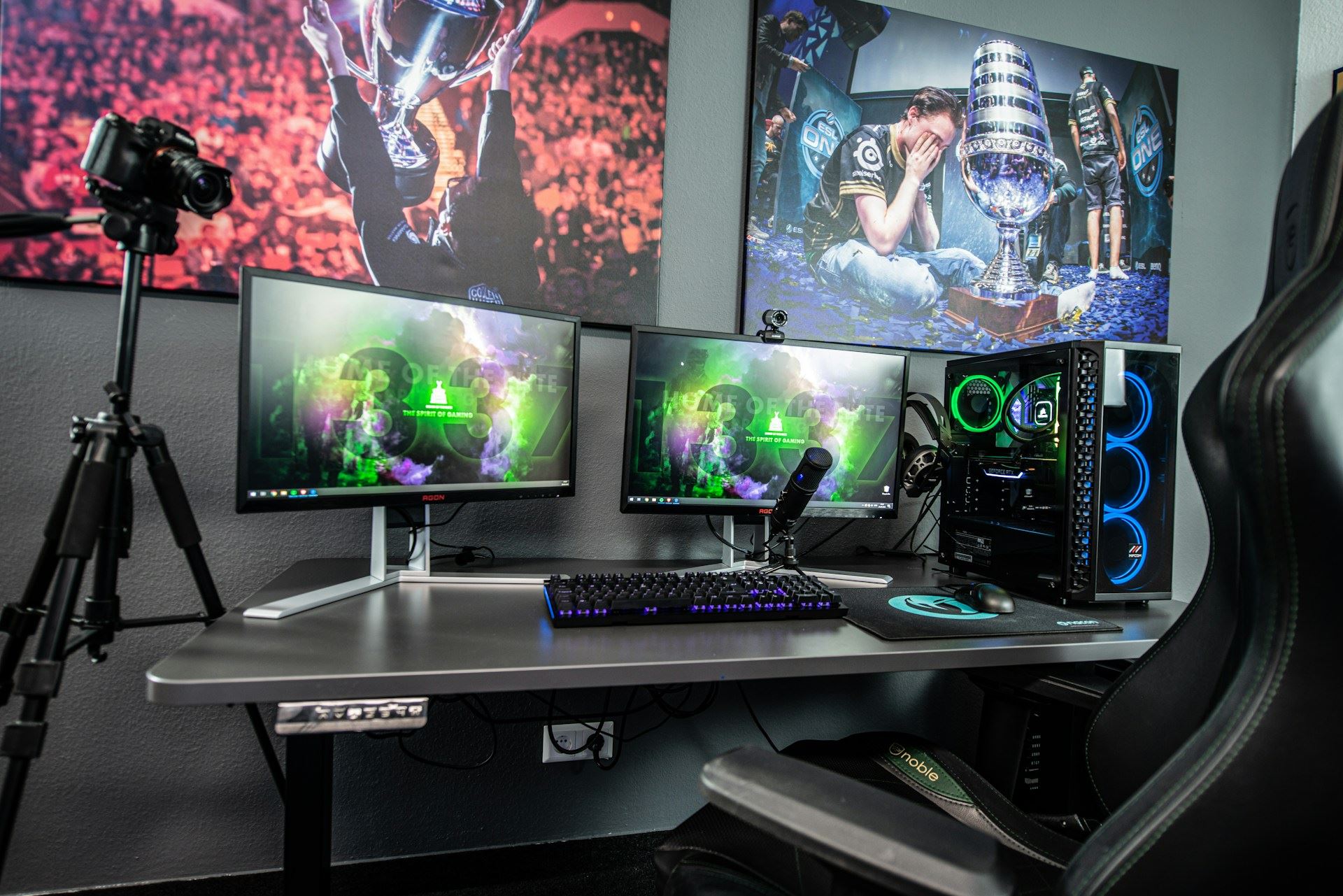Could Ireland’s tax credit for digital games do for the industry what Section 481 relief did for the movie business?
Many in the gaming sector think the scheme could be the catalyst for further investment and activity in a sector that’s been building steadily over recent years. In 2022, Black Shamrock, the company behind some of the world’s most popular action-adventure games for PCs and consoles, announced it would grow its Dublin studio into a 200-strong team.
The year before, League of Legends developer Riot Games chose Dublin as its first global remote broadcast and content production centre, dedicated to esports. It’s a strategic addition to the company’s existing EMEA HQ in Ireland. Other well-known industry names with a presence in Ireland include EA Games and Demonware, while Keywords Studios is a service provider to many other games companies.
Rounding out the ecosystem are third-level institutes producing graduates with skills suited to the sector, while there’s also a vibrant community of homegrown games companies and startups. “There are a lot of small indie developers in Ireland, trying to make a business out of making games and there are also good community groups like the Games Co-Op in Dublin, Game Craft and Galway Game Jam,” says Alanna Kelly, co-founder of Galway Game Jam and board member of Imirt, an association for Irish digital games makers which was among the groups that campaigned for the tax credit.“Digital gaming is a priority sector for IDA Ireland. We are committed to supporting new businesses wishing to expand into Ireland, taking advantage of the business-friendly environment, skilled workforce, and strategic location on offer to multinationals,” says James Farrell, senior vice-president of consumer and digital technology with the agency.
In 1997, the Irish Government introduced Section 481 to incentivise film and TV, animation and creative documentary production. The credit helped to attract projects to Ireland, including the Oscar-winning movies Braveheart and Saving Private Ryan. Crucially, this production activity helped to hone the skills of Irish-based creators, who learned their craft by working on these projects. The digital gaming sector believes its tax credit could lead to a similar outcome as people build up their knowledge and expertise through exposure to top-class developers and titles.

Digital gaming’s growing influence
The comparisons only go so far, because the digital games market has outstripped the movie business. In 2023, worldwide box office receipts were $33.9 billion; by contrast, in the same period the global games industry was worth multiples of that – $184 billion. And it’s growing at a healthy 8.76% per year. Further proof of gaming’s growing presence in popular culture is in Disney buying a $1.5 billion stake in Epic Games, the maker of Fortnite.Launched in late 2022, the Digital Gaming Credit hopes to encourage studios to set up in Ireland, or expand their operations here. Other countries offer similar tax credits for the industry. Under the Irish scheme, eligible companies can avail of a refundable tax credit equal to 32% of expenditure they incur on designing, production and testing a digital game, up to a limit of €25 million per project.
The first company to successfully apply for the credit was StoryToys, which plans to reinvest the credit in new products and people. The Dublin-based company is an interesting case study by itself, because it grew a successful children’s apps business from Ireland. Its flagship product was an app based on Eric Carle’s classic children’s book, The Very Hungry Caterpillar, which caught the eye of some major global brands.
The app gained attention globally, and ultimately caught the eye of the likes of Disney and the LEGO Group. Since then, big kids’ brands have come to them.
“We’re really proud of the work we do with some of these international companies, when there are alternatives available in those countries. They’re coming to us because there’s a real sense of trust in what we're doing and what we can deliver. There's incredible creative talent coming out of Ireland, but also really strong tech talent as well,” says Nelson.

A vote of confidence in Ireland
One of the biggest endorsements of Ireland as a location for building a games studio came when John Romero chose Galway as the base for his company Romero Games. Romero is games industry royalty, having originally developed the game series Doom – one of the most successful video games of all time.Many jobs in the industry don’t necessarily call for in-depth digital and gaming skills, and Ireland is well placed to serve those needs too. Alan Bridgeman, Riot Games’ VP Enterprise EMEA & APAC, says the company’s EMEA HQ in Ireland touches all aspects of the company’s intellectual property (IP), product, and business, with teams in crucial areas including data analytics, R&D, or information security.
“We appreciate when our colleagues love gaming and have a connection to the gaming community, but there are teams within Riot such as engineering, finance, legal, HR or workplace experience that play a significant and important role and don’t necessarily require a high level of digital or gaming skills. Many of them have come through the Irish educational system and have been very successful in Riot,” Bridgeman says.
“The way that mobile games work, but also many PC console games, they aren’t just something you launch anymore, sell at your local game store, and then they’re gone. The games industry has evolved in how we capture audiences and maintain them, as we’re releasing content forever. We want that [customer] relationship to deepen over time,” says David Eckelberry, senior vice president at Scopely.The Digital Games Tax Credit’s arrival coincides with a shift in the way games are developed, and this has implications for where studios locate. Unlike finite movie productions, games are now geared towards ongoing development over a long term, often involving hundreds on a team to produce engaging, immersive experiences that keep gamers coming back for more.

Collaboration and acquisition
Scopely’s experience proves this in practice. Since 2015, it had collaborated with Digit Game Studio in Ireland, developer of the runaway success Star Trek Fleet Command which launched in 2018. The following year, Scopely acquired Digit and the team has grown since.“We say that launching a game is just the beginning,” says Eckelberry. “If you’re successful, you’re going to double down and triple down because finding a success is really hard. And once you have it, you want that golden age to last as long as possible. The Star Trek team was smaller prior to release and that number has doubled with the people in Ireland,” says Eckelberry, who relocated from the US to lead the team here.
Having experienced the ecosystem for himself, Eckelberry thinks Ireland stands to benefit as investment returns to the industry after a few lean years. “And there are people all over the world that are happy to relocate to Ireland – I’m just one of those people. Culturally, Ireland benefits from that.”

Success breeds success
Another effect of building an ecosystem is that creative talent has a “force multiplier” effect. “Some people over the years have left, taken what they’ve learned, and then they want to go build their own studio. That’s natural in the gaming space. We see hubs around the world are formed when there’s a successful game,” Eckelberry adds.Other parts of the ecosystem will need ongoing support. Dr Maria O’Brien, a lecturer and researcher on cultural and creative industries, points out that the games tax credit has an “explicitly cultural” aspect. While she welcomes the initiative, she believes it should be adjusted to reflect that games can sometimes take more than three years to develop.
“What success will look like in a number of years for Imirt and for the games industry are that Imirt will be a fully funded advocacy group that will have a permanent full time CEO and support staff so that we can actively take part in conversations with policymakers and inform them and that we can represent our members properly and that we will have representation internationally as well for all levels of the gaming industry, whether it's indie developers, smaller studios and so on.”
“In my view professionally as an academic and Imirt board member, it is essential to have a vibrant domestic industry as well as working to encourage foreign direct investment. We have to have a strong coherent ecosystem in place that includes education, funding for bodies like Imirt, a coherent action plan across all bodies,” Dr O’Brien says.

Room for “explosive growth”
Emmet O’Neill, StoryToys CEO, believes that past success of the film and animation industries in Ireland can show the way for the growing games and digital media sectors. “I think the Irish games industry is where the animation industry was 20 years ago. We have successes here and there, some homegrown and some as part of international games companies. But just like the animation industry in the early 2000s, there is room for explosive growth right now. The support is there at the government level… this is the time to grow the games sector.”Claire Nelson adds: “When you start to get the backing from the government to start investing in that, that’s the ‘pull’ into Ireland, and I expect things will follow from that. Any country that has done that has become a hub for gamers and for industry growth. There is every reason why this will be true for Ireland. We have a talented and educated workforce, we have a tradition steeped in creativity.”
James Farrell is Senior Vice-President of Consumer and Digital Technology for IDA Ireland, working with and supporting multinational companies both in the consumer and digital tech industry and in the business services industry to identify opportunities where Ireland can add value to their international growth and to drive further investment into Ireland.
